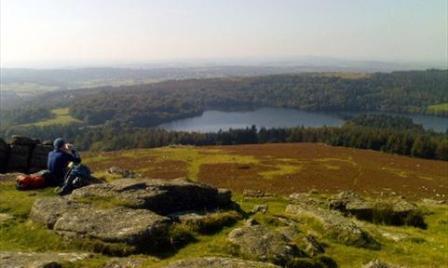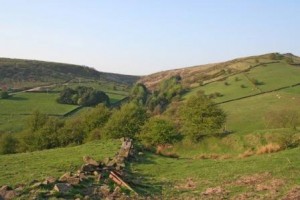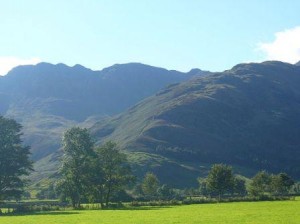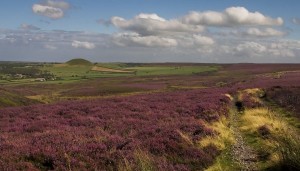
Dartmoor National Park, Devon - © Dartmoor.co.uk
The Dartmoor National Park is located in the county of Devon in south west England. Dartmoor was one of the first UK national parks designated back in 1951, the area is known for its scenic landscapes, tors, wildlife and charming small towns and villages.
Dartmoor includes the largest area of open country in the south of England, the area has a wealth of history with in excess of 1,200 scheduled ancient monuments. The area includes a range of wildlife, National Nature Reserves and Sites of Special Scientific Interest (SSSIs).
The area is popular for day trippers, horse riding, canoeing, fishing, walking and cycling with a number of routes to explore. Visitors can enjoy the scenic natural landscape, tranquilly and biodiversity around the area.
Quick Facts
Dartmoor National Park:
Year of Designation: 1951
Population: 34,000
Scheduled Ancient Monuments: 1,208
Conservation Areas: 23
Size in square kilometres: 953
Main Settlements: Ashburton, Buckfastleigh, Chagford, Moretonhampstead, Princetown and Yelverton.
Located in: Devon.
Highest Point: High Willhays at 621 metres.
Attractions
Dartmoor National Park is located in the scenic county of Devon in south west England. The scenic landscape has inspired many poets, authors, artists and photographers over the years drawn to the areas character and history. The location in the county of Devon means visitors to Dartmoor swell in the summer months with many visitors and holiday makers visiting the region on holiday and short breaks. Dartmoor is located around 200 miles from London, making it an accessible location for visitors from London and the south east region, the distance means visitors can enjoy a weekend or short break at the national park.
The area is famous for its granite, tors and ponies, the landscapes and local towns and villages are full of history, each with its own fascinating storey to tell. Dartmoor does not include any major cities or towns within its borders, the main settlements include Ashburton, Buckfastleigh, Moretonhampstead and Chagford with a number of smaller villages and hamlets. The cities of Exeter and Plymouth in Devon are both located within 10 miles of the national park boundary.
The special qualities relating to the areas landscape including its distinctive character shown in its towns, villages and hamlets, geological features, archaeology, cultural heritage and nature conservation along with wildlife Dartmoor is home to over 50% of Britain’s population of globally threatened species including blue ground beetle and bog hoverfly make Dartmoor a special place.
Local accommodation includes a mix of hotels, B & B’s, Guest Houses, Self Catering houses, cottages, camping facilities and pub stays; there is accommodation available in Ashburton, Chagford, Princetown and more that are all conveniently located for further exploring the Dartmoor. The cities of Exeter and Plymouth offer a range of accommodation, facilities and amenities making them a popular choice for visitors to base themselves from when exploring Dartmoor and the local area.
Visitor attractions in the area include Buckland Abbey located in Yelverton. The abbey, gardens and estate includes over 700 years of history, dating back to the 13th century. Inside the abbey, highlights include the chapel, the kitchen and the dining room, there are a number of period features, historic treasures and artefacts to see. The abbey gardens were designed primarily in the 1950s; there are also the Elizabethan Garden and Cider House and Kitchen Gardens each of which includes a range of trees, scrubs and flowers. The estate includes a number of walking routes where visitors can enjoy a walk in the countryside in splendid surroundings, ideal for enjoying the beauty and tranquillity of the countryside with woodlands, water features and wildlife.
Visitor Centres are located at various locations across Dartmoor. Visitor centres are located at Princetown, Postbridge and Haytor, each has knowledgeable staff with local knowledge on local attractions, things to see and do, local tips and advice. The centres include books, maps, gifts, stationary, toilet facilities and more. A visit to the centres along with a number of community information points and local information points provide a good first port of call for visitors and can help to better plan, organise and enjoy your trip.
Castle Drogo is located in Drewsteignton close to Exeter, in Devon. Referred to as the last castle to be built in England, the imposing castle is in fact 100 years old, built from local granite the castle is also a family home and includes modern conveniences. There are a number of exhibitions for visitors to view in the rooms, there is a scenic terraced garden and winding paths on to the Teign Valley where there are river trails and a range of wildlife. Among the activities visitors can try are mountain biking, orienteering and geocaching. The castle hosts a number of events that are held throughout the year. There is a café on site with a choice of food and drinks, shop where visitors can find gifts and souvenirs and a plant centre that includes a choice of seasonal plants.
Dartmoor Towns & Villages include Moretonhampstead, a town located in the north east of Dartmoor. The historic town is a popular base for those taking part in activity holidays and outdoor pursuits with a choice of facilities and amenities for horse riding, walking, bird watching and more. Known as one of the gateway towns to the national park there are a number of studios, galleries and a flourishing arts and crafts scene. There is a choice of accommodation available for visitors along with an open air swimming pool and a number of charming teashops where visitors can enjoy tea, cakes and refreshments. The town hosts a number of events throughout the year including an annual carnival held in August. Local places of note include the Cross Tree and the historic Almshouses thought to date back to the 15th century.
Bovey Tracey is a compact town located on the West Teign river in the north east of Dartmoor. Known as ‘the gateway to the moor’ the town includes a farmers market on alternate Saturdays and includes a number of shopping facilities including a number of specialist shops. The town is noted for a number of listed buildings including the Grade I listed, Church of St Peter, St Paul and St Thomas of Canterbury dating back to the 14th century. On the edge of town is the House of Marbles, a glass studio and manufactory on the site of the historic pottery. Bovey Tracey is the headquarters for the Dartmoor National Park Authority. Local attractions include the Devon Guild of Craftsmen located in a refurbished mill, an exhibition space for contemporary craft and design there are hand made gifts and contemporary works for visitors to see.
Okehampton is a historic market town located in the north of Dartmoor, the town is well known as a centre for walking in Devon. North of Okehampton are the two highest peaks in Dartmoor and to the south is Lydford Gorge, the deepest gorge in the south west of England with a 30 metre waterfall. The town still has a regular farmers market twice a month; local sights include the ruins of Okehampton Castle and Chapel of St James that dates back to the 15th century. There are shopping facilities at the Victorian shopping arcade along with a museum and scenic park ideal for enjoying picnics. A number of activities are available here including fishing, golf, swimming, riding, cycling and walking.
Tavistock is a historic compact market town; historically the stannery town was at the heart of copper production. Nowadays the charming town it noted for its country atmosphere and includes a number of specialist vintage shops. The town is a local centre for shopping facilities and entertainment and is a popular destination for visitors to Dartmoor. The town hosts a number of annual events including the Tavistock Music Festival in May, The Goose Fair in October and the Dickensian evening in December. Local sights include the ruins of Tavistock Abbey, Church of St Mary Magdalene and Tavistock Parish Church. Major annual events for locals and visitors alike include: the Goose Fair in October, the Dickensian evening in December and the Tavistock Music Festival in May.
Guided Walks & Activities are available in Dartmoor, with professional, knowledgeable guides that have local knowledge and expertise. Guided walks and activities are available from Dartmoor National Park Authority; visitors can take part in a number of walks, trails and a range of activities including cycling, fishing, horse riding, climbing, swimming, kayaking, canoeing and more catering for a range of interests and abilities. The activities and walks offer visitors the chance to learn more about the national park up close, its environment and benefit from the natural beauty of the landscape.
Visitors can enjoy a trip to Dartmoor, a popular destination for day trippers, short and weekend breaks and longer with plenty to see and do in the national park and the surrounding areas in Devon. The natural scenery, charming towns and villages and range of landscapes makes it an ideal place to relax and get away from it all or for those after something more active, there are a range of outdoor pursuits, whilst enjoying the largest area of open country in the south of England.
How to Get There
The Dartmoor is accessible by both car and public transport.
By Car:
Dartmoor is located approx 200 miles from central London. From London, take the A4, then the M4 motorway up to junction 20. Then at junction 20 take the M5 towards Bristol then take the A30 then take the B3212 that goes to Dartmoor. The approx journey time is 3 hours 30 minutes to 4 hours 30 minutes depending on traffic and time of day.
By Train:
The train stations at Exeter St David’s and Plymouth are located a few miles from the national park, there are regular services to and from London Paddington and London Waterloo stations, the journey time is approx 2 hour 30 minutes to 3 hours 30 minutes, depending on service, connections and time of day.
By Bus/Coach:
There are regular coaches available from London Victoria Coach station to Exeter and Plymouth. The approx journey times are 4 hours 30 minutes to 5 hours 30 minutes, depending on service, traffic and time of day. Coach services are provided by National Express.
Contact Details
Dartmoor Park Authority
Parke
Bovey Tracey
Newton Abbot
Devon
TQ13 9JQ
Telephone: +44 (0)1626 832093
email: visit@dartmoor.gov.uk
Website: Dartmoor National Park Authority
Map
View Larger Map
For Local Search and Directions see: Dartmoor National Park Map
Tips & Other Considerations
The weather and climate can be unpredictable, there can be elements of all four seasons in one day. Ensure you check the weather forecast before you travel and have the correct clothing and footwear including comfortable walking shoes, fleece, raincoat and umbrella.
Follow travel advice and remain alert, vigilant and aware of your belongings at all times especially your wallet/purse and valuables and ensure they are hidden away from public view. If you have a bag try to use a shoulder bag with a good quality, strong strap, that is put across your shoulder not on your shoulder making it more difficult for anyone to take your bag.
If you are travelling by car to Dartmoor ensure you are well prepared with maps and Sat Nav to aid your journey, particularly if you are not familiar with the local area and roads. Use the journey planner for door to door directions. Check traffic updates before you travel.
If you are looking for car parking in and around the national park, ensure you fully understand the rules, regulations & charges for car parks and street parking. The rules & regulations can be complex & confusing if you are unclear, it is wise not to park there.
If you are travelling by public transport, check for service updates prior to beginning your journey for any delays, disruption or cancellations to services that may impact on your journey. Ensure you have the service timetables for the trains, trams, buses and coaches. Remember when the last services are and ensure you make it to the train/bus/coach stops well in time to avoid missing the service.
Disclaimer: The information given in on this website is given in good faith and to the best of our knowledge. If there are any discrepancies in no way do we intend to mislead. Important travel details and arrangements should be confirmed and verified with the relevant authorities.




